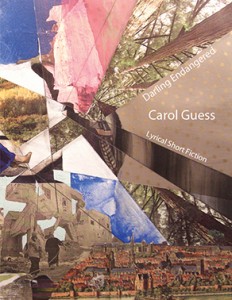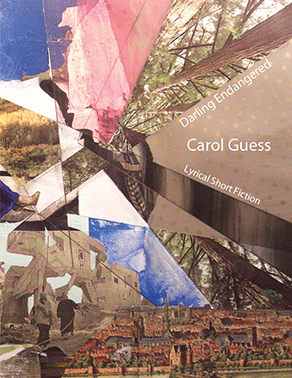 Darling Endangered: Lyrical Short Fiction
Darling Endangered: Lyrical Short Fiction
by Carol Guess
Brooklyn Arts Press. 80 pages, $14.95
IF YOU’VE EVER SPENT an afternoon lost in a museum, taking in new and unfamiliar works, then at dinner mistaken your fork for sculpture or the sound of cab tires on wet pavement for angel song, you are well prepared for the enchantments of Darling Endangered. Carol Guess weaves impressionist glimpses of character, tuneful poetics, and details ripe with working-class grit together into prose poems most of which are under one hundred words long. But however innocent these short pieces look on the page, they have a way of unseating a reader’s assumptions about fiction, poetry, and language itself.
It’s one thing to discuss these in the abstract, but consider this excerpt from “Nostalgia,” the book’s first piece: “We spun a radio out of the wreckage. Sidereal songs echoed over our cereal. Leaves tangerined. Surrogates shoved children on swings, hoping chains would make astronauts of all of us. In gym we could choose Flashdance or Golf.” Did you feel it? That tectonic readjustment from flights of colorful, sonic fancy to the thudding immediacy of place and time, that jolt of grounding detail, is a hallmark of these pieces. They’re exhilarating to take in, and may induce whiplash in the unprepared.
Such distinctively short pieces may evoke comparisons to Lydia Davis, but the similarities stop at word count. Guess reads more like a blenderization of author Carole Maso with songwriters Courtney Love and Exene Cervenka. Maso has always forged the form needed to contain and display the story she’s telling, pulling details in from outside her window and tacking them in the shadowbox of memory if that’s what the situation demands. Cervenka’s poetry and lyrics have kept an eye trained on the working class, their loves and loyalties. And Courtney Love may be a provocateur, a plastic surgery addict, and an addict in general, but she is also a true daughter of the Pacific Northwest. She may go on about Malibu, but lean closer and you can smell the loamy soil of a redwood forest in everything she does.
Guess teaches English at Western Washington University, and while these pieces are geographically wide-ranging, many of them evoke the coffee steam and creosote smells of the Olympic Peninsula. There’s also this odd nod contained in the last couplet of the piece titled “Scumbling”: “I sat very still, the model model. You sold my breasts to Microsoft and my spine to a doctor.”
The following is titled “Field”:
We fled the city at night. I was distracted by your body. My suitcase chipped at the bone in my thigh. Thieves stole doorways and sold them to trees, scrubby oaks that grew up on the street. Beyond the factory we slept in a field littered with swansdown, beer husks, bees. We fed a fire to blister coyotes. We strung death along on thinness alone.
Read it out loud if you haven’t already. The juxtaposition of sounds and the visuals they describe are kaleidophonic, twisting materials gleaned from such a small supply of words into something much larger. The simple appearance of the word “fled” immediately below the title drew a double-take from me, thinking I’d misread one or the other; the line’s shifting attention from “We” to “I” to “your” pulls attention along through distraction, as if on rickety wheels. In this world a commonplace urban drug deal is turned on its head and refreshed; even litter is part of the natural landscape. By the end, the alphabet itself feels like an unfamiliar neighborhood to walk through, full of new and foreign language and unfamiliar idioms.






